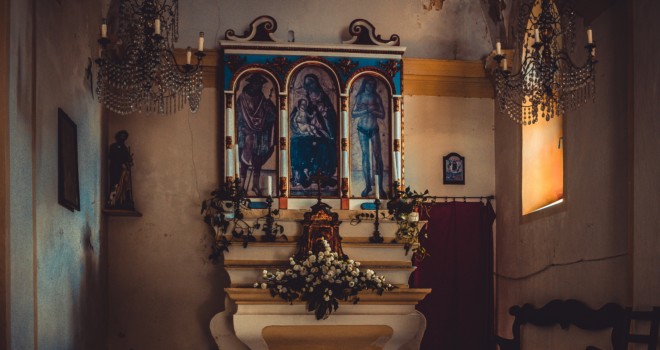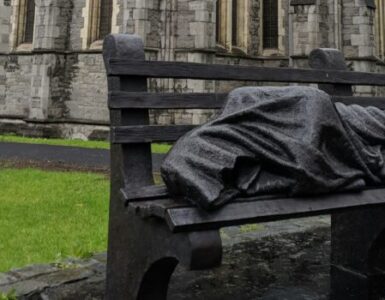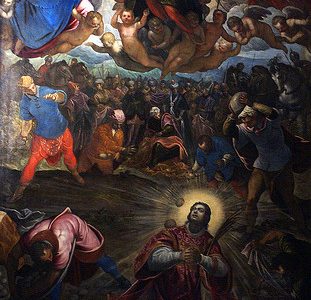As Christians, we have great hope in the resurrection. In fact, this is the hope that gives us the perspective we need to get through the hardest times in this life. But if we focus so much on our future hope of Heaven that we neglect our duties here on earth, we are failing in our mission as Christians. We need to find that balance between staying connected to Jesus and the cloud of witnesses and not always having our head in the clouds.
So how do we do that?
Mary & Martha
In Luke’s Gospel we read of a time when Jesus was visiting the sisters Martha and Mary of Bethany (Luke 10:38–42). Martha was being the hostess and working hard at serving Jesus and His disciples. Meanwhile Mary was seated with the disciples, listening to Jesus teach. Martha complained to Jesus and asked him to tell Mary to join her in the kitchen. But it probably came as a surprise to her when Jesus told her that Mary had made a better choice.
There would always be work to be done, but when it’s time to be in the presence of Jesus, the work can wait. This tells us that there is a certain priority of devotion over service. As I like to say, you have to seek Christ before you can serve Him. If you don’t first go to Christ and receive from Him (especially in the Eucharist), then you have nothing to give to others. So, your first priority is to “abide” in Him by going to worship and receiving the Eucharist.
Having said that, Jesus did not mean to imply that we should only worship and never work. What we receive from Christ is meant to be shared with the world by loving our neighbors. And how do we do that? Well, this is where we come full circle to the resurrection body. Remember that the resurrection body will be the same body that we inhabit now. That means that the bodies of those we see around us are God’s good creation and are meant to be redeemed and raised perfected. This is what we often refer to as the corporal works of mercy.

Corporal Works of Mercy
The corporal works of mercy come in part from that passage with
Jesus’ teaching on the sheep and the goats in Matthew 25, where He says that
whatever we do to the least of His people, we do to Him. There are slightly
different versions of the list, but in general they are these:
- feeding the hungry
- giving drink to the thirsty
- clothing the naked or giving alms to the poor
- sheltering the homeless or refugees
- visiting the sick
- visiting
prisoners or freeing slaves - burying the dead
These works are not optional for Christians; they are our mission in the world. Of course, we have to acknowledge that each person cannot do all of these at the same level of involvement. We are all called to different aspects of the mission, and some of us will focus on one thing, while others focus on something else. But any Christian who is not putting time into something on this list is missing an important part of ministry.
To fail to engage in the corporal works of mercy is to embrace that gnostic dualism that says the human body is disposable. And that is simply not what we believe. We are not spirits trapped in bodies, and we are not minds longing for freedom from the material world. We are embodied spirits — whole people made of both mind and spirit and body.
There is an aspect of the Kingdom that is present among us now. So, in a way, our eternal life has already begun, in the sense that we abide in Jesus through the sacraments of His Church, and in the sense that we participate in the work of the Kingdom through corporal works of mercy. Jesus said something that can be translated as “Behold, the kingdom of God is in the midst of you” or as “Behold, the kingdom of God is within you” (Luke 17:21). Either way, it’s true. But right now, we know God only as though we’re seeing Him through a dark glass (1 Cor. 13:12). We still wait for the time when we will see Him “face-to-face.”
Yet, as St. Paul tells us, three things remain: our faith, which gives us peace of mind that we will be reunited with our loved ones who passed on before us; our hope, which gives us the confidence of the big picture to live through the trials of this life; and love — both the love of God for us, and our love for each other — which carries us through to the resurrection and into eternity. Love will never go away, because love is eternal.
In Heaven There Ain’t No Beer
I remember, as a Milwaukee kid, that there was a song that got played at every wedding. The line I remember is: “In Heaven there ain’t no beer, that’s why we drink it here.” It doesn’t sound like a very deep theological statement, but it does get at the core of the question: What will Heaven be like? What will we be like, and how will we interact with others and with the environment in which we find ourselves?
And how do we prepare for Heaven now?
It turns out that “Heaven” is a kind of a catch-all term
for the afterlife, but that our experience of life after death is split up into
two phases. The first phase is Paradise. After we die, we go through the
purification of Purgatory, and then enter Paradise. The second phase comes
after the end of human history — it’s the resurrection and our entry into the
eternal Kingdom of God.
So, for now, take care of your body as perhaps God’s greatest gift to you other than salvation. Don’t abuse it, don’t subject it to harsh chemicals or excessive work or stress. Do enjoy the beauty of creation. Seek out ways to appreciate creation in nature, art, and music. Actively thank God for good food, and yes, even beer — just don’t indulge in ways that harm the body God gave you or dull your mind and lead you to make bad choices.
Also make sure to intentionally take care of
the bodies of others. Reject any dualism of spirit and matter that relegates
the physical body to anything less than an essential part of who we are as
human beings. Give alms to the poor, volunteer at a food pantry or a homeless
shelter, or volunteer at a hospital, hospice, or prison. And for the majority
of us who are not called to a vocation of directly caring for the bodies of the
dead, we can encourage our relatives to reject the current trend of having secularized
memorial services in funeral homes or hotel banquet rooms, and insist that any
Christian who dies deserves to have a funeral service in a church, preferably
with a Mass, if appropriate. Finally, reject all forms of entertainment that
exploit the bodies of others, even when they are willing participants. In these
ways, we will honor the bodies that God created for us and that will be with us
in the Kingdom.
“Ashes to ashes and dust to dust” is not the end of the story, especially if it causes us to think that the afterlife is a disembodied existence. An afterlife that is spiritual only, or mental without being physical, is not a Christian idea — it’s a pagan idea. We know better. We look forward to the resurrection of the body, because even in the post-resurrection Kingdom of Heaven, we have not escaped creation.
Ashes will be raised and joined with ashes; and dust will be raised and joined with dust as God redeems and remakes the body for a new and eternal life.
✠
This article is from a chapter in Dr. Papandrea’s latest book, What Really Happens After We Die (There Will Be Hugs in Heaven). You can find the book as a paperback or ebook from your local bookstore or online through Sophia Institute Press.
Photo by Sergiu Vălenaș on Unsplash
















